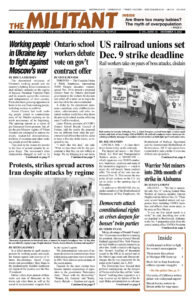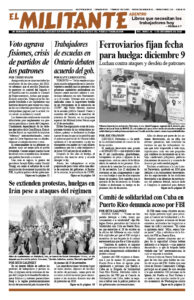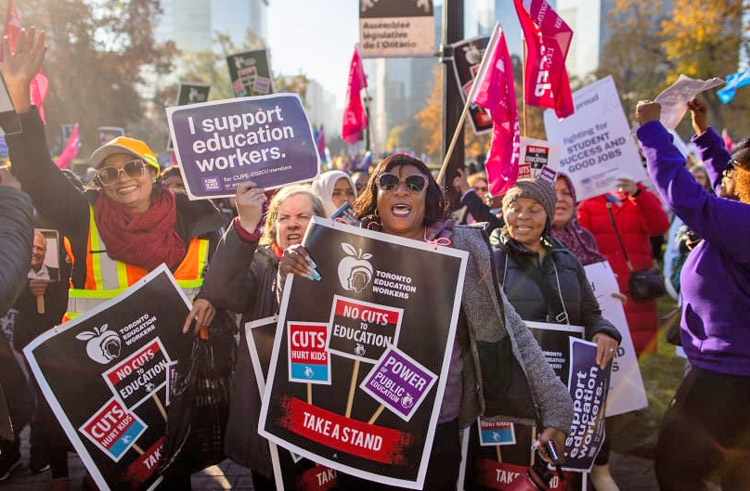TORONTO — The Canadian Union of Public Employees, representing 55,000 Ontario education workers, agreed Nov. 20 to present a proposed contract from the Ontario provincial government to the workers for decision and called off a strike set to begin the next day while the vote is conducted.
A strike by the educational assistants, custodians, early childhood educators, administrators and other essential workers would have shut down the provincial school system, affecting some 2 million students.
Laura Walton, president of CUPE’s Ontario School Boards Council of Unions, told the media the proposal was no different from what the government had offered that led the union to issue a five-day strike notice, as required by law.
“I don’t like this deal,” she said. “What we have been told by this government is that they are not willing to budge. We are bringing it to our members to have the vote” and then decide whether to strike.
Backed by a mobilized labor movement, the Canadian Union of Public Employees had mounted a two-day strike at the beginning of November in defiance of Bill 28, anti-labor legislation adopted by the Conservative Party government of Premier Douglas Ford that outlawed their right to strike. It also levied draconian fines on both individual workers and their union if they did so anyway and imposed contract terms that didn’t come close to the workers’ wage demands. The workers were fighting to deal with the impact of inflation, years of declining wages, and for increased staffing and services to students.
Under pressure from the powerful labor mobilization, the provincial government was forced to repeal Bill 28, one of the most onerous pieces of anti-labor legislation in Canada in decades. Actions included a series of solidarity demonstrations around the province of thousands of workers organized with the support of the Ontario Federation of Labor, and the threat of a province-wide strike.
While agreeing to return to work while negotiations were taking place, the union continued to mobilize and gain more support. It organized “Solidarity Saturday“ rallies each weekend in over a dozen cities across the province.
The CUPE education workers are the first union in Canada to defy government anti-strike legislation in over two decades. The mobilization of union solidarity forced the government to back down from the two-tier poverty wages it had tried to impose under Bill 28. Half the education workers are forced to do a second job to make ends meet.
The government proposal being voted on is based on a $1 an hour across-the-board wage increase for all the workers each year of a four-year contract. That means that the lowest-paid workers would receive the highest percentage increase — about 4% a year. The union had demanded an increase of $3.25 an hour.
“I pay two bus fares to get to work, Monday through Friday. That’s 160 Canadian dollars [$120] every two weeks just to go to work,” Theodora Asare, who tends to special needs students at a school in Thornhill, told the Militant at a Nov. 19 rally. “I just look at the calendar and wait for the next paycheck so that I can pay the bills and put food on the table for my family.”
‘Never just about wages’
Ontario Education Minister Stephen Lecce attacked the union, claiming the workers didn’t care about education, but were focused “entirely about wages.”
“It was never just about wages,” countered Walton. “From the beginning, we’ve been focused on improved jobs for education workers and improved services for students.
“For us, there is not one without the other,” she said. Students “deserve time with educational assistants so they can learn; they deserve early childhood educators in every kindergarten class; they deserve libraries that are open and staffed; and they deserve schools that are cleaned every day,” she said, explaining that’s exactly what the government refused to agree to.
Angela Brandt, president of the Ontario Autism Coalition, underlined how crucial the services CUPE is fighting for are.
“Families are in crisis and for most parents school is the only refuge for their children. Without proper support, children with special needs are not able to access the curriculum and their safety is at risk,” she said. “The value of these workers is priceless.”
Al Denis, head caretaker at General Crerar Public School in Scarborough, told the Militant, “I’ve done this job for 20-plus years. We used to have two or three caretakers full time during the day to keep buildings clean and safe. Now I’m the only one working during the day and I can’t keep up with everything. I’m voting no!”
Vicky Mercier, a teacher at General Crerar, said that most CUPE workers she spoke to “said that while a dollar an hour is not enough, they’re not sure how to vote; they need more time to think about it. It’s a huge discussion and the outcome of the vote is far from clear.”
The vote on the tentative agreement will take place Nov. 24-27.
Vicky Mercier, a Toronto teacher and member of the Elementary Teachers of Toronto union, contributed to this article.


